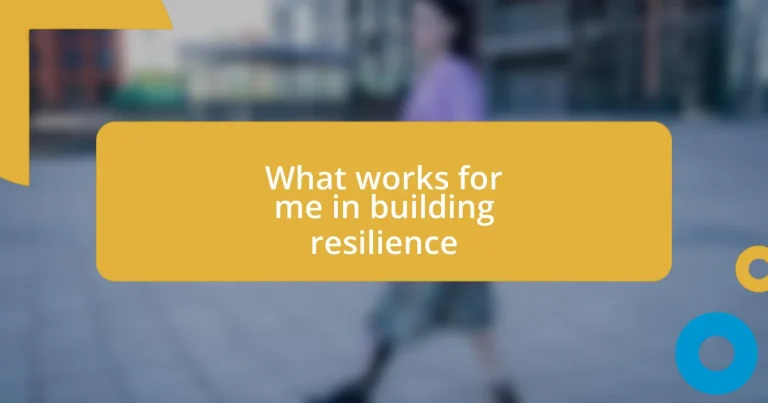Key takeaways:
- Resilience is nurtured through mindset shifts, self-compassion, and recognizing that challenges offer opportunities for growth.
- Establishing daily routines, fostering social connections, and practicing gratitude contribute significantly to emotional strength and resilience.
- Reflecting on past experiences and setting balanced personal growth goals can lead to greater self-awareness and resilience in navigating life’s challenges.
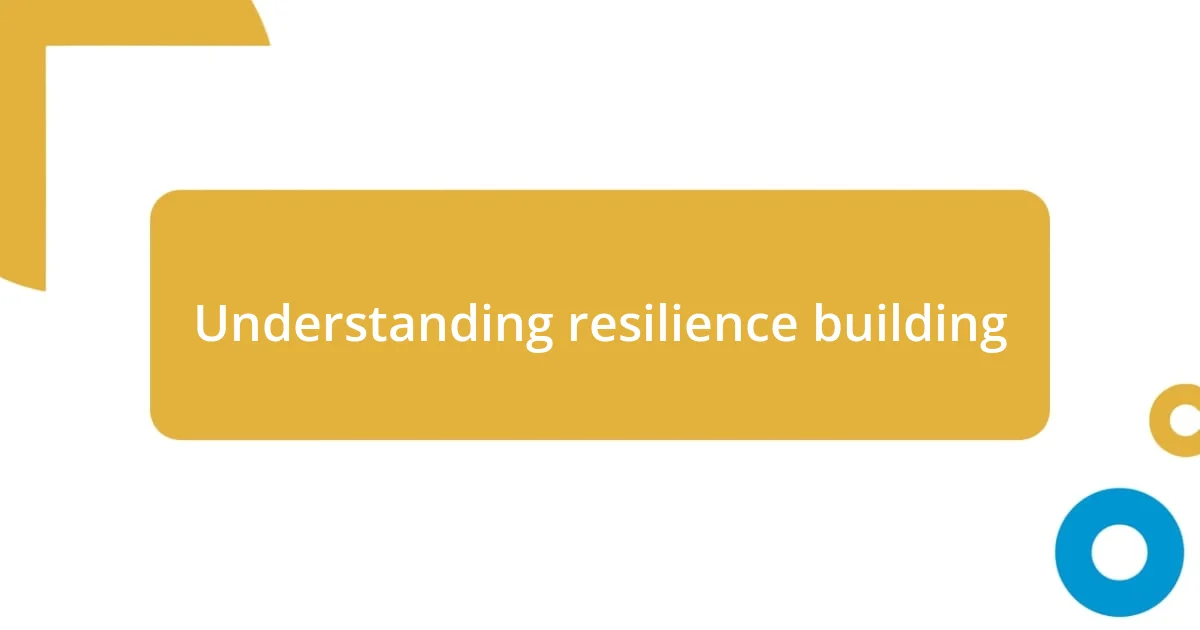
Understanding resilience building
Resilience building is a dynamic process that involves developing our emotional strength and adaptability in the face of challenges. I’ve often found that when life throws me a curveball, like an unexpected job loss or a personal setback, it’s my ability to bounce back that truly defines my response. Have you ever noticed how some people seem to handle difficulties with grace while others struggle? The difference usually lies in their mindset and the skills they’ve cultivated over time.
For me, understanding resilience means recognizing that it’s not about avoiding stress but learning how to navigate through it. I remember a time when I faced a particularly tough time in my studies; instead of retreating, I sought support from friends and mentors, which helped me reframe my challenges as opportunities for growth. This shift in perspective is crucial—do you see how embracing vulnerability can lead to strength?
Moreover, resilience is often about practicing self-compassion and maintaining a sense of purpose. There have been days when I’ve felt overwhelmed, yet reflecting on my core values has been a grounding force. What about you? How do your values guide you when the going gets tough? Ultimately, building resilience is a personal journey, shaped by our experiences and choices, which makes it uniquely ours.
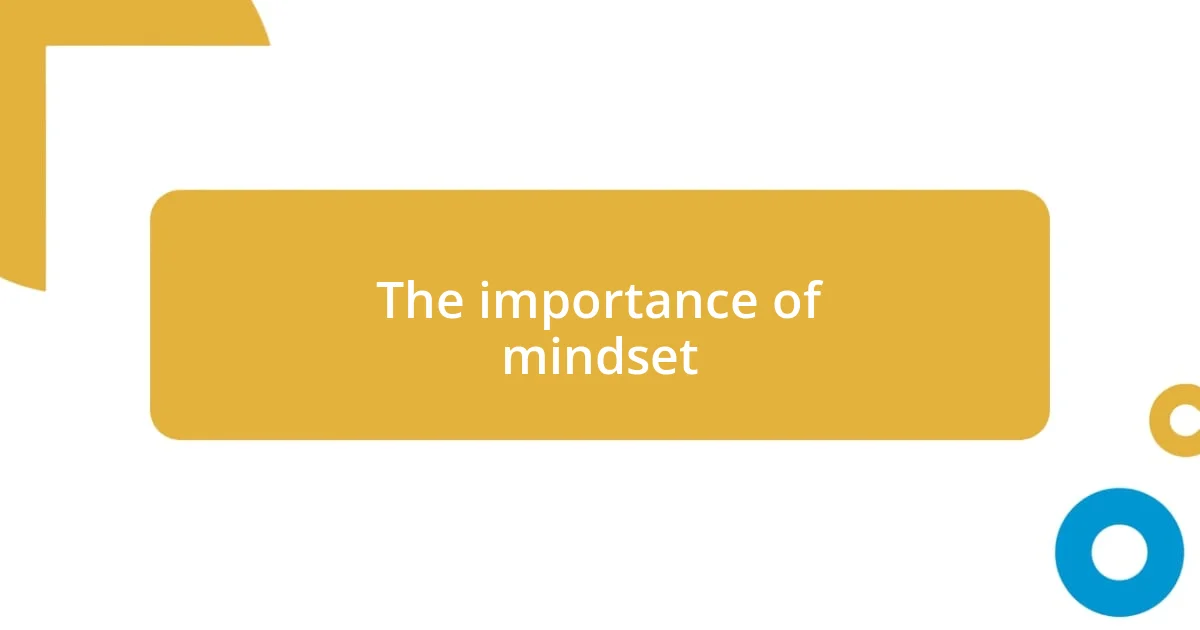
The importance of mindset
Mindset plays a pivotal role in building resilience. I’ve learned that my thoughts can either lift me up or drag me down during tough times. For instance, when I faced a challenging project that felt insurmountable, shifting my inner dialogue from “I can’t do this” to “I’m still learning” transformed everything. This simple change in mindset empowered me to break the project into manageable tasks, making it far less daunting.
- A positive mindset enhances adaptability: I find that when I approach challenges with an open mind, I’m more willing to explore creative solutions.
- Self-talk is powerful: My practice of positive affirmations has helped me to combat negative thoughts that can creep in during stressful moments.
- Fostering a growth mindset leads to continuous learning: Each setback becomes a stepping stone rather than a stumbling block, which fuels my desire to improve and evolve.
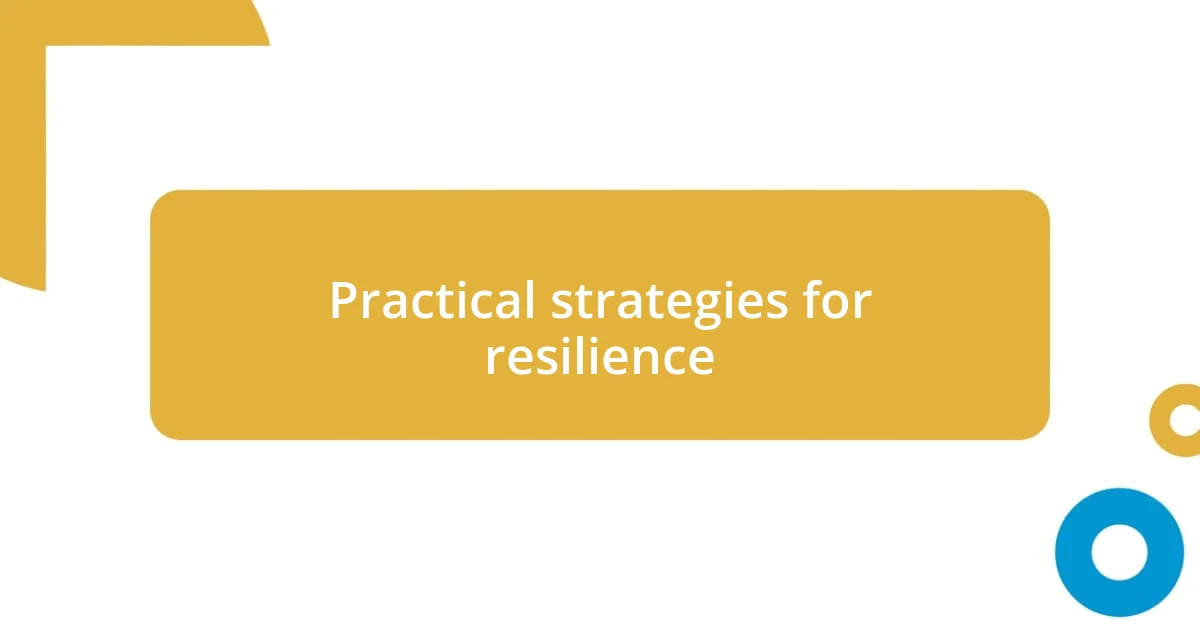
Practical strategies for resilience
When it comes to practical strategies for resilience, I’ve discovered that establishing a routine can be incredibly beneficial. Creating a daily schedule helps me maintain a sense of control, especially during chaotic times. For instance, I committed to a morning practice that includes meditation and exercise. This not only grounds me but also sets a positive tone for the day.
Social connections are another pillar of resilience. I’ve seen firsthand how reaching out and engaging with my friends and family can provide both support and perspective. In moments of doubt, a simple phone call or coffee date has often lifted my spirits. I encourage you to think about the relationships in your life—who can you turn to when you need a boost?
Lastly, cultivating a mindset of gratitude has shifted my focus from what I lack to what I have. I started keeping a gratitude journal, where I jot down at least three things I’m thankful for each day. This practice has made me more aware of the positives in my life, reinforcing my emotional strength during tough times. What small gratitudes could you recognize to enhance your resilience?
| Strategy | Example from My Life |
|---|---|
| Establish a Routine | Morning meditation and exercise |
| Engage Social Connections | Regular coffee dates with friends |
| Cultivate Gratitude | Keeping a daily gratitude journal |
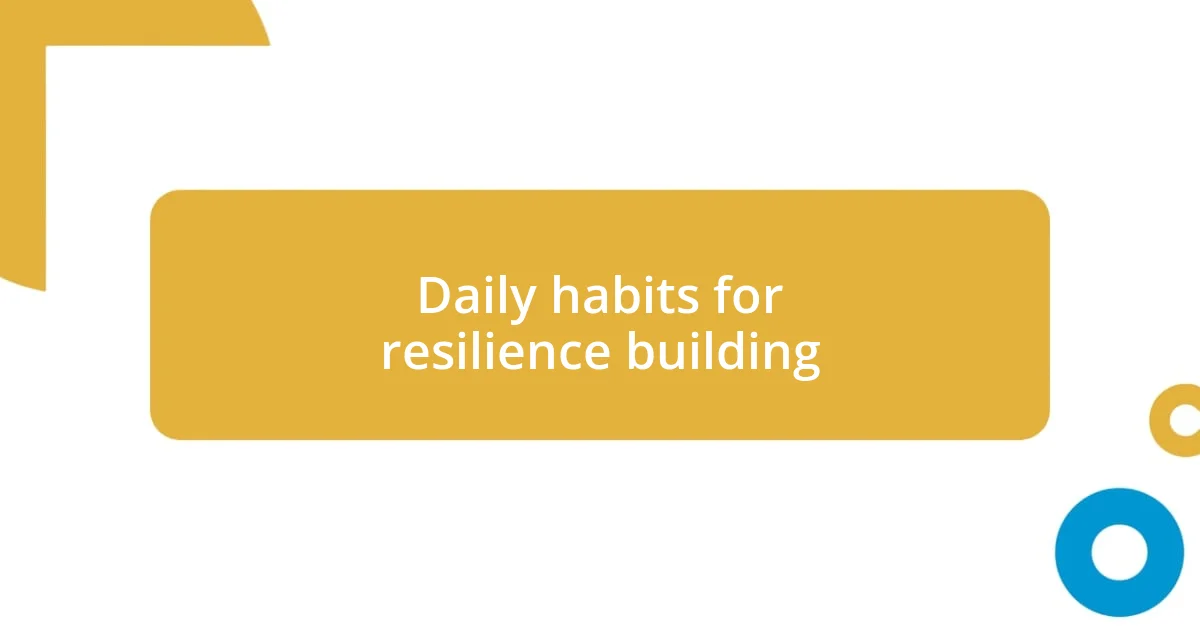
Daily habits for resilience building
Building daily habits for resilience is something that I’ve truly embraced over the years. One habit I swear by is setting aside time for mindful breathing every morning. This simple act of pausing—taking deep breaths—centers me before I dive into my day. Have you ever noticed how just a few moments of calm can transform your mindset? I certainly have, and I often find that tackling the day’s challenges feels more manageable afterward.
Another crucial habit I’ve found useful is dedicating time to learn something new each day. Whether it’s reading an article, watching a tutorial, or even experimenting with a new recipe, expanding my knowledge fuels my resilience. I remember one winter, when I took up painting during my downtime. The process of learning a new skill not only distracted me from stress but also sparked joy and fostered a sense of achievement. What new experiences could you pursue to enhance your coping skills and elevate your spirits?
Lastly, integrating moments of joy into my daily routine has been a game-changer. I make it a point to savor my favorite cup of coffee every morning, really taking the time to enjoy it. It’s a small pleasure, but I’ve noticed how it shifts my mood and frame of mind for the day ahead. Can something as simple as a daily ritual ignite your resilience too? For me, these moments of joy cultivate a sense of hope and provide an emotional buffer against life’s inevitable ups and downs.
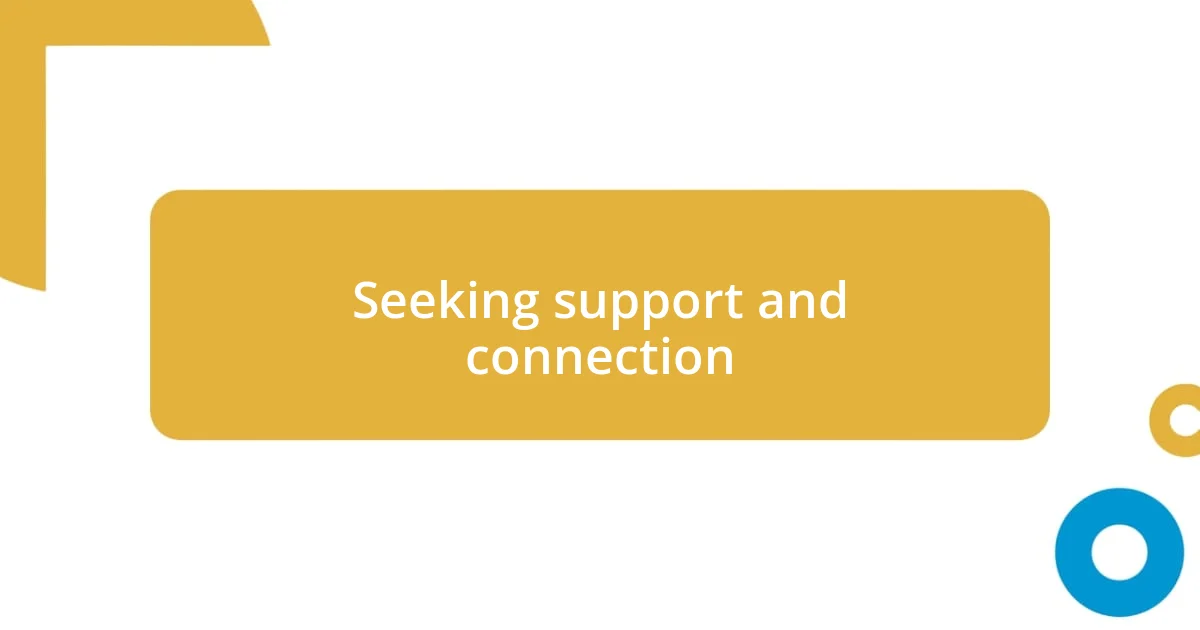
Seeking support and connection
There have been times in my life when I’ve really relied on the people around me. I remember facing a particularly tough season at work, feeling overwhelmed and isolated. Reaching out to a close friend for a chat not only provided me with emotional support, but it also opened up new perspectives I hadn’t considered. How often do we underestimate the impact of simply talking things through with someone who cares?
I also find that community can be a powerful source of resilience. Joining a local book club transformed my social life. It wasn’t just about discussing novels; it was about connecting with others who share my interests and experiencing a sense of belonging. Have you ever noticed how being part of a community can help lighten your emotional load?
On occasions when I’ve felt alone in my struggles, volunteering has uplifted my spirit immensely. Helping others shifts my focus away from my own challenges and reminds me of the strength that can come from shared experiences. It’s fascinating how service can forge connections, even with strangers, and create a network of support that feels rewarding and enriching. Who could you help today that might also lift you up?
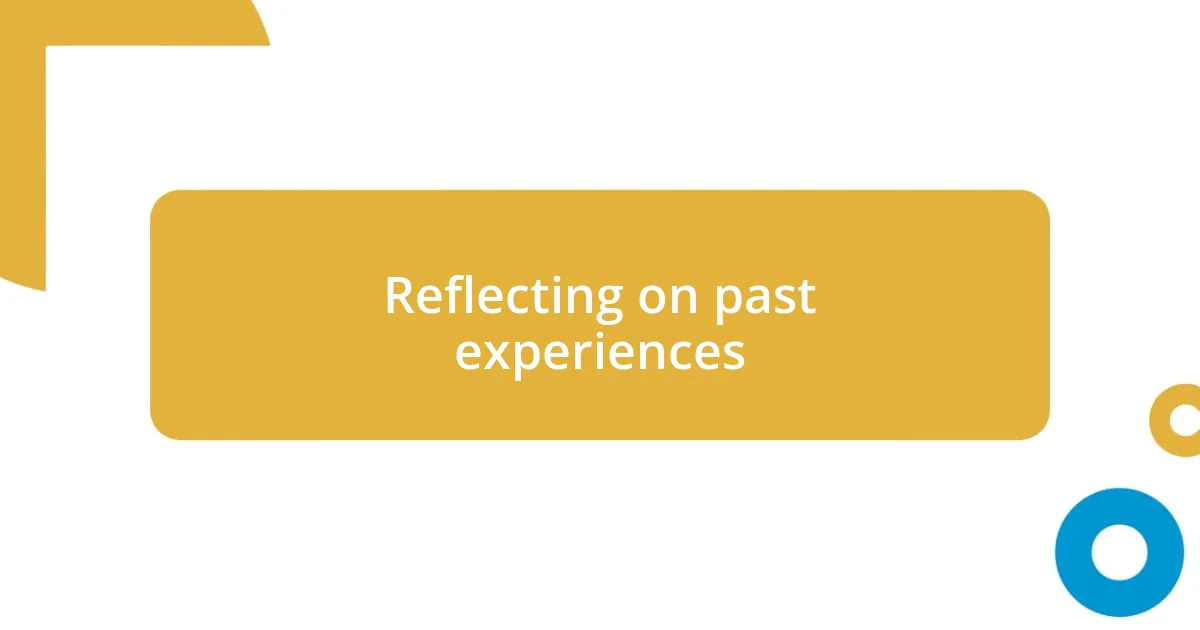
Reflecting on past experiences
Reflecting on my past experiences has been an illuminating journey that constantly shapes my resilience. I remember a time when I faced significant setbacks in my career, and while it felt overwhelming, looking back now, those moments taught me invaluable lessons. Isn’t it interesting how, in hindsight, we often recognize the silver linings where we couldn’t see them before?
One particularly tough episode occurred when I lost a job that I believed defined my worth. In my reflection, I realized that my identity wasn’t tied to one position but rather to my skills and passions. That lesson was a turning point; it empowered me to explore new opportunities that aligned more closely with my authentic self. Have you ever had an experience that reshaped how you view your capabilities?
As I ponder my past relationships, I’ve come to appreciate the growth that comes from both the positive and negative interactions. I learned that even challenging conversations can be pivotal, helping me understand my boundaries and fostering deeper connections with others. Remembering these interactions allows me to approach current relationships with more empathy and openness. How has reflecting on your experiences helped you nurture resilience in your own life?
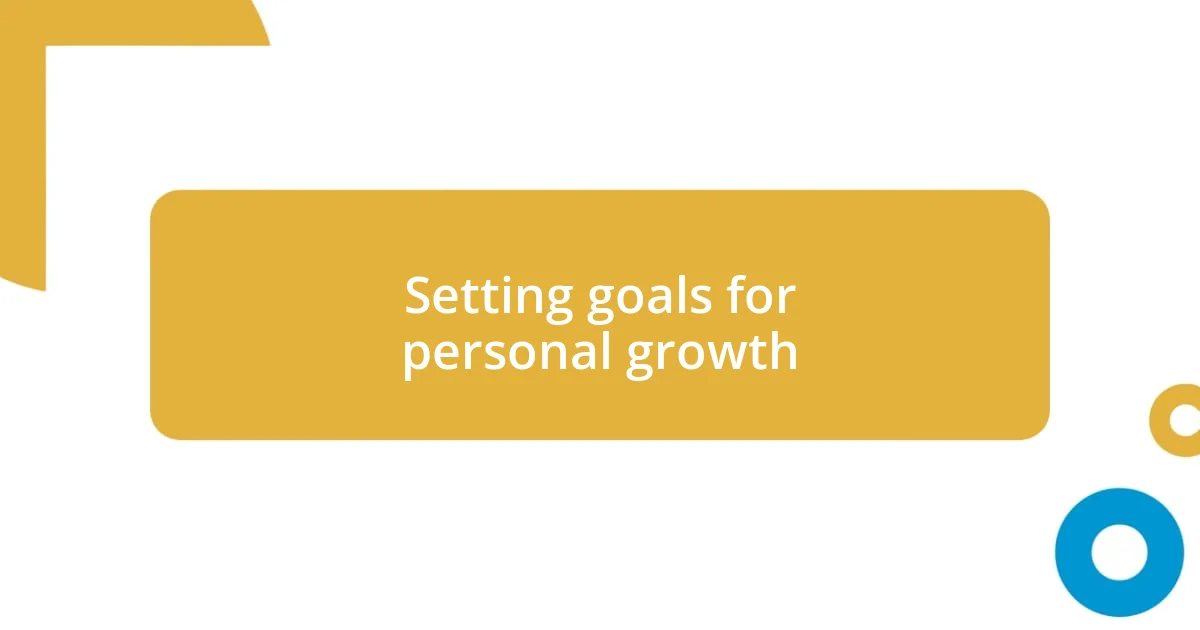
Setting goals for personal growth
Setting goals for personal growth is like charting a map for my journey of resilience. I recall a time when I decided to focus on enhancing my public speaking skills. Initially, it felt daunting, but setting small, achievable goals—like joining a local Toastmasters club—transformed that fear into excitement. Have you ever set a goal that pushed you outside your comfort zone and ended up benefiting you in unexpected ways?
Another experience that stands out for me is when I realized the importance of balancing my goals across various life domains. I once strictly concentrated on my career, neglecting my health and relationships. By creating goals that prioritized personal well-being, such as committing to regular exercise and quality time with loved ones, I witnessed significant growth and resilience. How do you ensure that your goals encompass the different aspects of your life?
Sometimes, it can be eye-opening to look at setbacks as stepping stones. Last year, I aimed to read one book a month but fell short. Instead of feeling defeated, I reassessed my approach. I shifted my goal to focus on the joy of learning, rather than just ticking boxes. This change allowed me to engage more deeply with the material, fostering both knowledge and resilience. Have you ever adjusted your goals in a way that brought you greater satisfaction?












